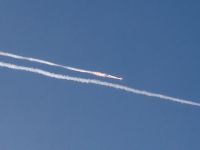After a sharp escalation in the violence that exploded across the Palestinian territories almost seven weeks ago, Israelis are bracing for what they fear could be a "new Lebanon" with gun and bomb attacks taking the place of running street battles.
"The crisis with the Palestinians is swiftly accumulating all the accursed characteristics of the Lebanese quagmire," the best-selling Hebrew newspaper Yediot Aharonot said, referring to Israel's 22-year occupation of southern Lebanon which ended in May.
Four Israelis, among them two soldiers and a Jewish settler woman, were killed in shootings in the West Bank and Gaza Strip on Monday, the deadliest day for Israel since the Palestinian Intifada or uprising began.
A total of 24 Israelis, half of them civilians, have been killed in the violence that has also claimed the lives of almost 200 Palestinians and Israeli Arabs -- figures that have raised accusations by human rights groups that Israel is using excessive force.
What started out as widespread street clashes with Palestinians pelting stones and occasional firebombs at Israeli troops who fired back, often with live bullets, has developed into smaller-scale concentrated gun battles both day and night.
"The terrorist activities have taken on a new character in recent days with shooting concentrated on roads," charged Israeli army chief of staff Shaul Mofaz.
Acting premier Binyamin Ben Eliezer, a hawkish member of Prime Minister Ehud Barak's government, also accused Palestinian leader Yasser Arafat of waging a "war of the roads" against Israelis.
"Under Arafat's new strategy anything goes if it causes the blood of Jews to flow," he told army radio.
The violence is the deadliest since the first Intifada that claimed the lives of some 1,600 Palestinians between 1987 and 1993, when the two sides signed the Oslo accords setting in motion Palestinian autonomy.
The latest Palestinian uprising was triggered by a visit on September 28 by Israel's hardline opposition leader Ariel Sharon to the al-Aqsa mosque compound in Jerusalem.
The area, the third holiest shrine in the Muslim world, stands on the site of the former Jewish temple and is the object of a fierce dispute over sovereignty.
Israeli government spokesman Moshe Fogel said the Palestinians had been behind 1,300 shooting and bombing incidents, with a marked proliferation in recent days at West Bank flashpoints such as Ramallah, Bethlehem and Hebron.
Israeli leaders have begun talking of "guerrilla war" and "mini-war" and the "Lebanonization" of the conflict, which has left the seven-year-old Oslo peace process in tatters.
Israel lost hundreds of soldiers during its ill-fated and bloody occupation of Lebanon, where it faced a guerrilla war waged by the fundamentalist group Hezbollah.
"According to the army, the new Palestinian tactic is to attack soldiers and civilians on the roads, in order to make Israel think the price of holding on to the territories is too high," the leading Haaretz newspaper said.
"Israel is attempting in vain to convert the Palestinian uprising into violent incidents," charged Palestinian minister of parliamentary affairs Nabil Amr.
"The incidents have proved that the Israeli army, which threatens that it has not used all of its available forces yet, is unable to affect Palestinian struggle even if it uses all of its force," he told Voice of Palestine radio.
But he said the Palestinians would not surrender until they had achieved a Palestinian state on the land captured by Israel in the war 1967 war -- the West Bank, Gaza Strip and east Jerusalem.
"Actions on the ground form a battle of national independence while for Israel it is the battle of imposing conditions," he said.
And newspaper commentators suggested Israel had learnt nothing about guerrilla warfare since its hasty withdrawal from Lebanon in May.
"Apparently two decades of being stuck in the quagmire of Lebanon were not enough for Israel to draw the proper conclusions regarding fighting against guerrilla forces," wrote Reuven Pedatzur in Haaretz.
"IDF commanders have simply not internalized the lessons of Lebanon and are repeatedly finding themselves surprised and at their wits-end when confronted with irregular, rather small forces using light weapons," he wrote.
Pedatzur charged that the frequent use of combat helicopters against Palestinian targets "constitutes the use of a completely disproportionate degree of military might against the other side ... which could wind up needlessly escalating the present conflict" -- JERUSALEM (AFP)
© 2000 Al Bawaba (www.albawaba.com)







